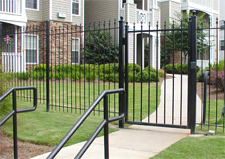|
|
|
|
|
Community Association Update / Issue #24
New Library Article: Inspection and Copying of Association Records
HOAs Prohibited from Fining Homeowners for Failure to Water
Asked & Answered: Riding Motorized Scooters in HOA Common Areas?
HOA Restrictions on Electronic Cigarettes (E-Cigs)
Non-residents Accessing HOA Property? Be Wary of Prescriptive Easements
|
|
|
This Community Association Update is part of our commitment to providing the highest quality legal services to our clients and industry partners. If your company or Association would like to see a topic or issue covered in future editions, feel free to call our offices, email us, or submit a question online! | |

| Sincerely,
Steven J. Tinnelly, Esq.
|
|
Inspection and Copying of Association Records
New Library Article

There are numerous records and items of information maintained and generated by a HOA in the course of its operations. It is common for a HOA member to request copies of such records and information, especially in connection with an ongoing dispute the member may have with the HOA. Upon receipt of such a request, HOA boards and management professionals often have questions concerning the scope of the HOA's responsibilities in responding to the request and in ultimately providing the member with the requested records and information.
The California Civil Code contains several provisions governing (1) the degree to which a HOA member is entitled to inspect and to copy certain "association records," (2) the degree to which certain association records are not subject to inspection or copying by a member, and (3) the process through which the HOA must produce or provide access to its records in response to a member's request. Our attorneys have published a new library article on these issues which provides an overview of these provisions, as well as some general guidance for HOA boards and management professionals.
Click here to read our new library article entitled:
"Inspection and Copying of Association Records"
|
HOAs Prohibited from Fining Homeowners for Failure to Water

In its third consecutive year of severe drought, California faces a historic water shortage and wildfire danger. According to Mashable.com and US Drought Monitor, "The entire state is in some stage of drought, with 77% of the state suffering from 'extreme' to 'exceptional' drought conditions." Matters are expected to worsen, as California continues to experience its hottest year on record.
In response to these conditions, Governor Brown signed an Emergency Drought Proclamation in January 2014 declaring a state of emergency and calling upon all Californians to voluntarily reduce their water usage by 20 percent. As residents of homeowners associations ("HOAs") began responding to the Governor's plea by reducing their irrigation, HOAs fined their members for failure to maintain their yards in accordance with the governing documents. This led to swift action by both the Governor and the California Legislature.
In April, Governor Brown signed an Executive Order which effectively prohibits HOAs from fining, or threatening to fine, homeowners "who comply with water conservation measures." The Order further provides that "any provision of the governing document, architectural or landscaping guidelines, or policies of a common interest development will be void and unenforceable to the extent it has the effect of prohibiting compliance with the water-saving measures contained in this directive." One of these water-saving measures is to limit outdoor watering to no more than twice per week...
Click here to continue reading our blog post entitled:
"HOAs Prohibited from Fining Homeowners for Failure to Water"
|
Riding Motorized Scooters in HOA Common Areas?
Asked & Answered

Asked - We have continued problems with unruly, unsupervised, and destructive children in our community's common areas. They ride motorized scooters, skateboards, bikes, etc. all throughout our walkways and have collided with people and animals on several occasions. Our property manager said that nothing can be done because any rules aimed at restricting such conduct would be "discriminatory" against children. What are our HOA's options?
Answered - It is true that Federal and California courts have applied anti-discrimination laws, such as the Fair Housing Act, to HOAs in order to prohibit them from discriminating against families with children. There are exceptions, however, in instances where a seemingly discriminatory policy/rule is designed to address legitimate health or safety concerns. Thus, for example, the HOA should be able to adopt a set of operating rules restricting scooters, skateboarding, bicycling etc. in certain common areas where those activities represent a significant threat of personal injury or property damage. Provided that those rules do not single out "children," but instead apply to all persons in the community, they would likely be deemed reasonable and enforceable pursuant to Civil Code Section 4350.
Additionally, most sets of CC&Rs contain provisions restricting acts which constitute a nuisance. Thus, even in the absence of specific operating rules of the type referenced above, your HOA may still have the ability to address the activities at issue through enforcement of the nuisance provision contained in its CC&Rs...
Click here to continue reading our blog post entitled:
"Riding Motorized Scooters in HOA Common Areas?"
|
HOA Restrictions on Electronic Cigarettes (E-Cigs)

The popularity of electronic cigarettes ("E-Cigs") has increased in recent years. In light of unknown health risks, many state and local governments are passing laws restricting the sale and use of E-Cigs. HOAs are following this trend and adopting rules prohibiting their use in common areas.
Questions have surfaced regarding the extent to which a HOA's operating rules that already prohibit smoking in certain areas may be applied to restrict E-Cig use as well. Most sets of operating rules do not explicitly define "smoking." Additionally, while the California Legislature is attempting to include E-cigs under the traditional restrictions applicable to cigarettes, no statute has been enacted that does so.
HOAs that desire to treat E-Cigs the same as traditional tobacco smoking products should amend their operating rules accordingly. Such action may be done at the Board's discretion, pursuant to the rule change procedures required under Civil Code Section 4360 (i.e., provide general notice of the proposed rule change at least thirty (30) days before making the rule change, the decision on the rule change must be made at a board meeting, and after the decision is made, general notice of the rule change must be provided to the members within fifteen (15) days). However, prohibiting E-Cig use in the interior of the members' separate interests (i.e., not just in the common areas or exclusive use common areas) may require a formal amendment to the HOA's CC&Rs rather than a mere change to its operating rules...
Click here to continue reading our blog post entitled:
"HOA Restrictions on Electronic Cigarettes (E-Cigs)"
|
Non-residents Accessing HOA Property? Be Wary of Prescriptive Easements

An easement provides an individual with the legal right to a specific and definable use of another's property. A HOA's governing documents (i.e., CC&Rs) often provide numerous easement rights to its members for access and use of the HOA's common areas and recreational facilities. While those easement rights are reserved for the benefit of the HOA's members, their guests and tenants residing in the HOA's development, it is not uncommon for non-residents and general members of the public to utilize HOA common area facilities such as walkways, trails and parks. HOAs may run into issues when trying to exclude non-residents from those areas, and may be reluctant to take more formal measures needed to do so (i.e., the installation of controlled access gates, the use of security personnel, etc.).
However, if a HOA fails to take such measures and fails to actively prohibit non-residents from accessing the HOA's common area facilities, the open and consistent use of those facilities by non-residents may ultimately result in the creation of "prescriptive" easement rights for those non-residents. In the recent unpublished decision in Applegate Properties, Inc. v. Coronado Cays HOA ("Applegate"), the California Court of Appeals held that such prescriptive easement rights had been created over the common area of the Coronado Cays Homeowners Association ("Association")...
Click here to continue reading our blog post entitled:
"Non-residents Accessing HOA Property? Be Wary of Prescriptive Easements
|
TLG Expansion: New Greater Los Angeles Area Office!
 We are proud to announce the opening of our newest office located in downtown Los Angeles. The opening of this new office is in response to our expanding Los Angeles Area client portfolio. Our attorneys and staff are already beginning to enjoy the working relationship we are developing with our L.A. clients and their management. Our new downtown location will assist in providing them with the responsive and personalized serves for which we are known. Our US Bank Tower office is located in the heart of downtown Los Angeles in the premier Class "A" glass and stone building. At 1,017 feet, it is the tallest building west of Chicago and east of Hong Kong, with sweeping 360-degree views of the city. We thank all of our clients and industry partners for your continued support! Alterra Assessment Recovery - Year 1 in Review  We were pleased to launch Alterra Assessment Recovery just over one year ago in response to the frustrations of our clients dealing with the challenging environment of assessment collection. We developed Alterra with the goal of expanding our service offering, and providing our clients with access to comprehensive, efficient and effective assessment collection services. We are tremendously proud of the results that Alterra has secured for its clients since its launch--recovering over $300,000 in outstanding assessment debt in its first year. Alterra is privileged to now work with dozens of communities throughout Southern California ranging in size from 20 Units to over 4,200 Units. We thank our clients and industry partners for the trust and support that you have given to Alterra, as well as the positive feedback you continue to provide to Alterra and its team. As Alterra continues to grow, it will remain committed to securing results with a level of service and efficiency that is second to none.
To learn more about Alterra Assessment Recovery, click here.
TLG Welcomes Attorney Matthew T. Plaxon, Esq.!
 We are proud to announce the newest member of our team: Matthew T. Plaxton, Esq. Matt received his undergraduate education at California State Polytechnic University, Pomona, where he majored in Business Administration and minored in Contract Administration. He received his Juris Doctor from Western State University, College of Law, in 2012, where he focused on business organizations and real estate. During his law school experience, Matt was Editor-in-Chief of the Law Review and President of the Honors Moot Court Society. Matt gained valuable experience as a law clerk for David G. Sills, former Presiding Justice for the California Court of Appeal, Fourth Appellate District, Division Three. Prior to joining Tinnelly Law Group, Matt worked in a civil litigation firm where he obtained significant litigation and trial experience. For Matt's full bio, click here. He can be reached at matt@tinnellylaw.com.
|
|
Welcome New TLG Clients!
|
Moreno Valley
Fountain Valley |
Tustin Ranch
Riverside
|
|
|
|
|
|
Community Association Update - Issue # 24
New Library Article: Inspection and Copying of Association Records
HOAs Prohibited from Fining Homeowners for Failure to Water
Asked & Answered: Riding Motorized Scooters in HOA Common Areas?
HOA Restrictions on Electronic Cigarettes (E-Cigs)
Non-residents Accessing HOA Property? Be Wary of Prescriptive Easements
NOTICE: The information contained in the Community Association Update is for educational and informational purposes only and does not constitute legal advice, nor is it meant to create an attorney-client relationship.
|
 Corporate Headquarters: Corporate Headquarters:
30 Enterprise - Suite 320
Aliso Viejo, CA 92656
P: 949.588.0866
F: 949.588.5993
contact@tinnellylaw.com
| |
Orange County | Los Angeles | San Diego | Riverside County | San Francisco Bay Area
|
|
|